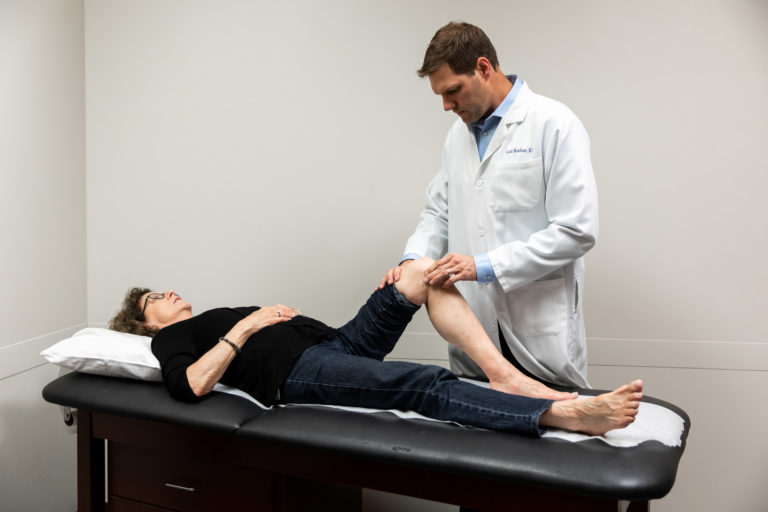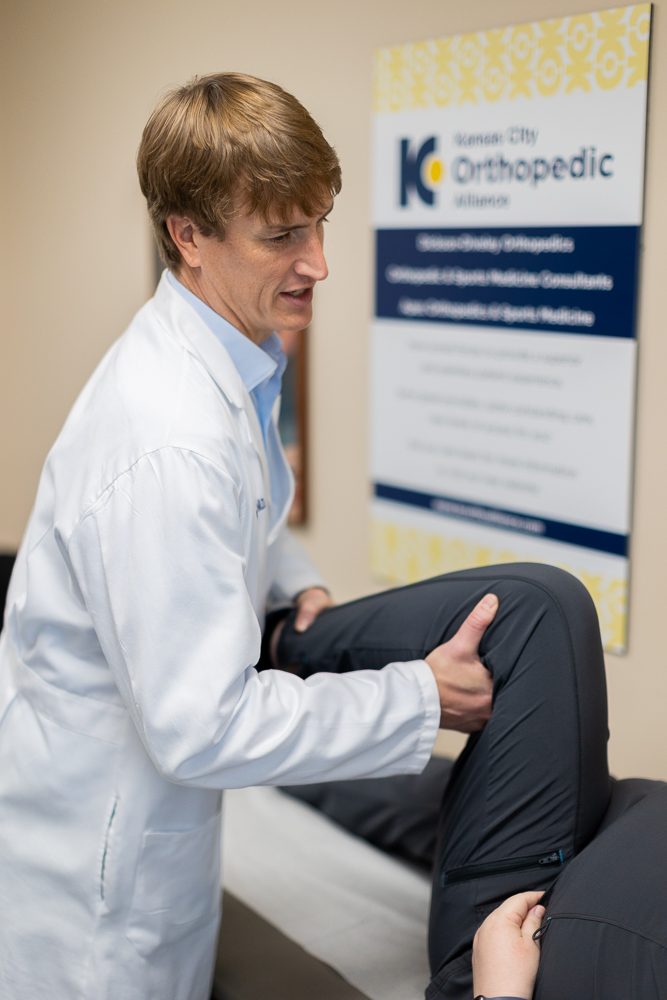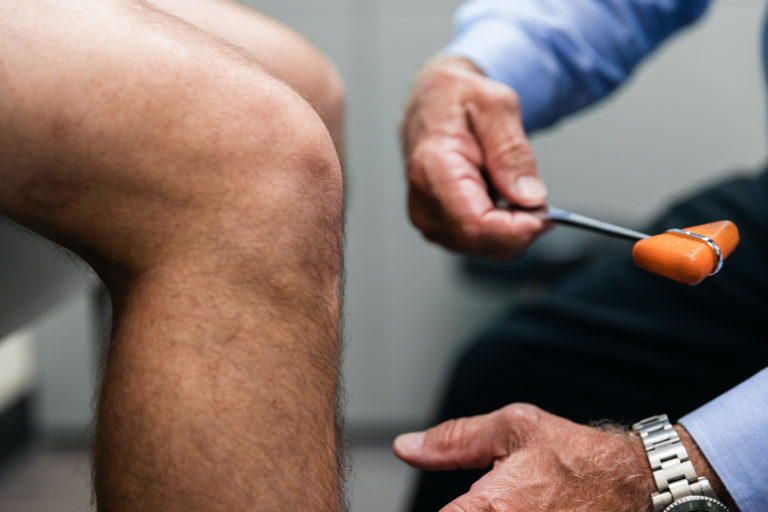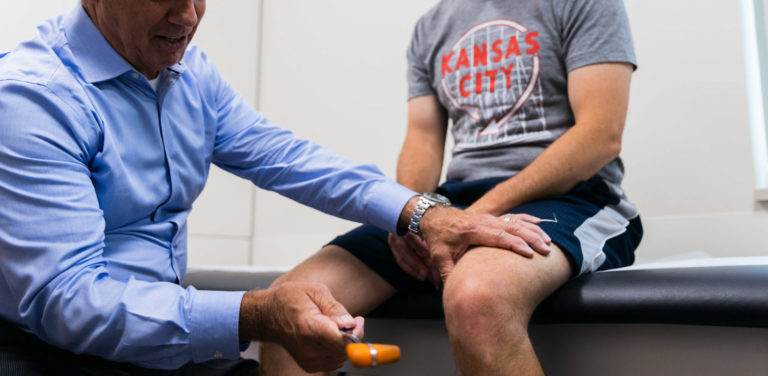Robotic-Assisted Knee Replacement in Kansas City
Robotic-Assisted Knee Replacement
It’s extremely rare that an acute knee injury might end up needing a knee replacement.
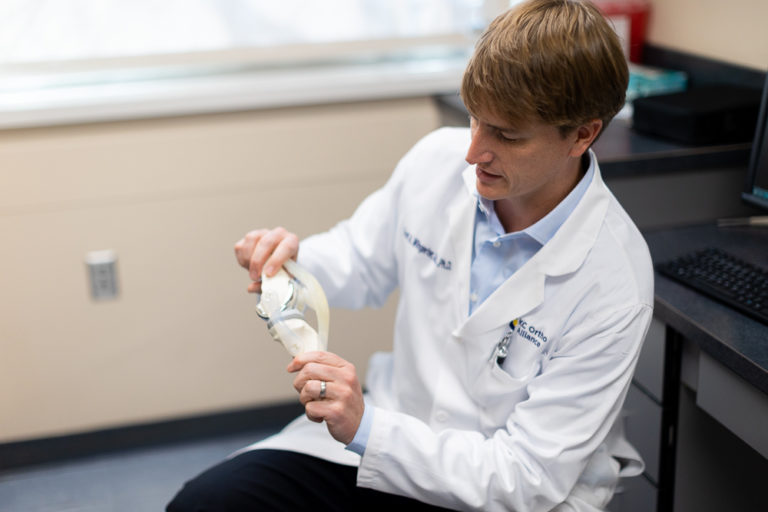
Understanding the Basics Behind Robotic-Assisted Knee Replacement
What is the Robotic-Assisted Knee Replacement?
Consistent knee pain resulting from arthritis can greatly hinder your ability to live your life.
Though our first option at Kansas City Orthopedic Alliance, if possible, is to avoid invasive procedures, sometimes surgical treatment is necessary to alleviate symptoms and restore function in the joint.
The providers and surgeons at KCOA pride themselves as leaders in orthopedic knee treatments. As such, our team is always looking for ways to utilize the latest technological advancements in our processes. One of these advancements is the use of robotic assistance for knee joint replacement. If your knee issues progress to the point where a total joint replacement is necessary, robotic assistance is a surgical option that may help enhance the accuracy and placement of your new prosthetic joint and lead to an optimal outcome.
The providers at Kansas City Orthopedic Alliance are adept at finding the necessary treatments to correct any knee issues. Our expert orthopedic knee physicians at Kansas City Orthopedic Alliance have the knowledge required to treat numerous issues, both surgically and non-surgically. When you visit a specialist at KCOA, we focus on creating a treatment plan based on your specific conditions, symptoms, and recovery goals.
Causes
Causes of Knee Pain
The body has different kinds of joints, and they all face different challenges. The severity of your knee and leg pain can vary based on a number of factors, including the location and the source of the issue. The knee is a very vulnerable joint in your body that’s susceptible to injury from a forceful motion, as well as the wear and tear, builds up over the years.
Your knee relies on a number of structures to function, including bones, cartilage, ligaments, and tendons. As the years go on, many people struggle with the effects of years of repeated movements, such as walking, running, or jumping. This can result in the need to seek out a total joint replacement from an orthopedic specialist in Kansas City.
When a patient visits one of our KCOA offices, a skilled orthopedic specialist will ask you questions regarding your symptoms, what aggravates/alleviates your symptoms, and whether you have attempted prior therapies. Next comes a thorough physical exam. We will then review any images you bring with you and/or take new images. After determining the cause of your pain, we can then discuss if a robotic-assisted knee replacement will work best for your needs.
Symptoms
Common Signs and Symptoms of Knee & Leg Injuries
With so many different structures working together in your knees, there are many potential causes of pain. And each of those causes has a unique set of symptoms.
Proper robotic-assisted joint replacement techniques can help treat your issues. Though you can treat many knee issues with conservative measures and non-surgical options, sometimes surgery may be necessary if the patient’s knee doesn’t respond to these treatments. Knee injuries can also degenerate based on certain risk factors, such as age, activity level, whether or not you’re obese, and more.
Common symptoms of a joint injury include:
- Swelling
- Stiffness
- Pain
- Pain when twisting or rotating the knee
- An inability to fully straighten your knee
- A locking sensation when attempting to move your knee

Choosing a robotic-assisted joint replacement in Kansas City is a decision that typically involves guidance from your primary care doctor and orthopedic physician.
When you choose Kansas City Orthopedic Alliance, one of our highly-trained orthopedic knee specialists will conduct an initial evaluation to better understand your condition. After a complete review of your results, your provider will then discuss whether surgery is the best option for you.
Kansas City Orthopedic Alliance Knee & Leg Injuries Assessment
Assessing the Injury
Determining the proper treatment process for knee and leg injuries starts with an assessment from one of our experienced providers.
You can think of knee pain as a spectrum, with some instances being more severe than others. The KCOA orthopedic specialists always focus on each individual patient and their concerns before creating a treatment plan.
Therefore, during your initial appointment, we will often ask questions such as:
- Does your pain currently limit you or your activities?
- Has your pain progressed or worsened recently?
- Has the malalignment or deformity progressively worsened in the past year?
- Did you notice or hear a popping sound at the time of your injury?
- Have you noticed any change in your symptoms that has made it more challenging to function?
- What are your lifestyle goals?
- How has pain affected those goals?
From there, we can decide what treatment option will align best with your needs and lifestyle goals. Once we’ve completed a proper assessment, your provider will often begin with a physical examination to help determine the origin point of your pain. In some cases, advanced testing may be required for a full diagnosis.
Examination
X-Ray
Also called radiographs, an X-ray captures a picture of the knee. Orthopedic physicians may order an X-ray to rule out the possibility of a fracture (broken bone), osteoarthritis, or other bone-related conditions.
Magnetic Resonance Imaging (MRI)
MRI captures images of muscles, bones, cartilage, and tendons to help provide information other tests can’t detail. During an MRI, you will lie on a table that slides into a tube-shaped scanner. The machine creates a magnetic field around you, using pulsed radio waves to form the MRI images.
CT Scan
A computerized tomography (CT) scan can provide a series of X-ray images taken from the ankle, showing the bones, blood vessels, and soft tissue in your body. This, ultimately, provides more detailed information than a regular X-Ray.
Treatment Options
Surgical Options
As trusted orthopedic surgeons in Kansas City, our providers are consistently doing what it takes to offer the most advanced treatments. If a patient needs a total knee replacement, they have options to choose a robotic-assisted procedure or a more traditional replacement surgery.
Robotic assistance refers to the usage of technology to enhance the accuracy and placement of the prosthetic in the joint. Throughout the process, your provider is in control of the technology, but the “robotics” helps guide them throughout the entire procedure.
At this time, robotic-assisted joint replacements are exclusively used for the knees and hips. However, as this technology grows and becomes more mainstream, KCOA plans to offer additional robotics-assisted procedures in the future.
Non-Surgical Options
In most cases, surgery is not the first option for treatment at Kansas City Orthopedic Alliance. If we can treat your knee issues with more conservative treatments, we’ll choose those options. We typically exhaust all non-surgical options prior to recommending surgery.
Non-surgical treatments for knee joint injuries include:
- Physical Therapy – A trained therapist will focus on the issue that’s causing the pain or symptoms as well as the deficits that are present as a result of degenerative knee issue. Stretches, strengthening exercises, manual soft tissue work and modalities like hot and cold therapy may be used to help you manage your symptoms and improve your function.
- Medications – Your doctor may recommend over-the-counter NSAIDs (Non-steroidal anti-inflammatory drugs, such as Advil) or prescription medications. Especially with NSAIDs, you should always talk to your doctor to ensure they are the right treatment for you.
- Stabilization – Stabilization involves the use of braces or other supportive devices to reduce stress, support or unload the affected surfaces of the knee, reducing pain and allowing the joint to function more normally.
- Injections – Cortisone injections can help reduce inflammation in the shoulder and can even provide additional insight into the cause of your shoulder pain. The amount of relief from an injection varies by patient, but often in combination with physical therapy, patients can experience significant improvements in their function.
Post-Op & What to Expect
The recovery process from any joint replacement surgery greatly varies on a number of factors. Your procedure, age, activity level, and other factors contribute to the length of your recovery. Generally, however, most people can expect to see noticeable improvement to symptoms and function within about 12 weeks after the procedure.
In the aftermath of your knee replacement, taking care of your body is essential. Your provider and your care team will provide you with a post-operative plan to achieve the best results from treatment. This treatment plan may include activities like exercise, mobility work, and physical therapy. If you live a sedentary lifestyle and don’t follow your treatment plan, you may not achieve optimal results.
Additionally, patients can improve their recovery results by taking medications and getting adequate amounts of rest. We expect patients will need to use assistive devices such as a walker, crutches, or cane for a few weeks following the procedure. Finally, make sure that you keep your incision both clean and dry throughout your recovery.
If you have any questions about your specific recovery process, contact your care team and they’ll get all your questions answered.
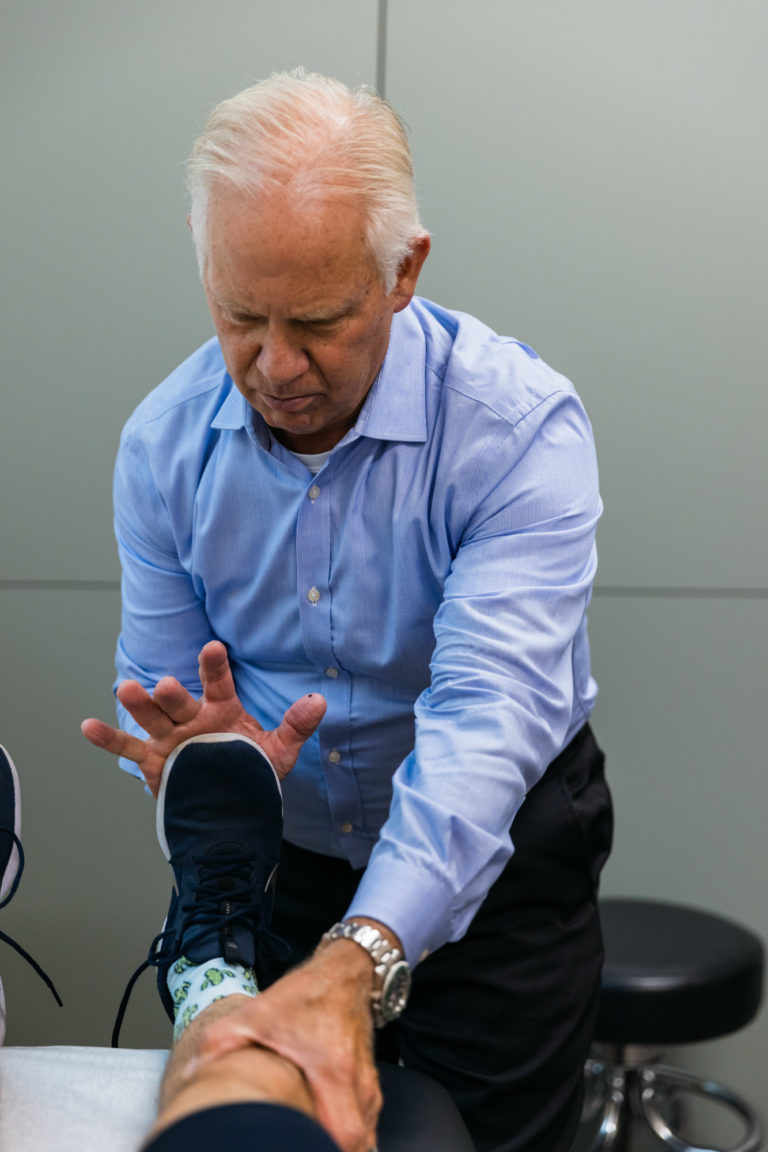
Kansas City Orthopedic Alliance is here to help.
Our care is personal. Our team is knowledgeable. And we’re more available than ever.
With access to board-certified specialists across Kansas City, we have the tools to meet almost every musculoskeletal condition.
Our Locations
Overland Park, Kansas
10777 Nall Ave Suite 300 Overland Park, KS 66211Leawood, Kansas
3651 College Blvd. Leawood, KS 66211Kansas City, Missouri
Saint Luke's Medical Plaza #1 4320 Wornall Rd., Ste. 610 Kansas City, MO 64111Belton, Missouri
Belton Regional Campus 17067 S Outer Rd #301 Belton, MO 64012Blue Springs, Missouri
St. Mary’s Medical Center, Main Entrance 203 NW R.D. Mize Road, Suite 200 Blue Springs, MO 64014Shawnee Mission, Kansas
7450 Kessler St ste. 140 Merriam, KS 66204Prairie Star (Lenexa, Kansas)
Prairie Star 23401 Prairie Star PkwyBldg. B, Ste. 220 Lenexa, KS 66227

